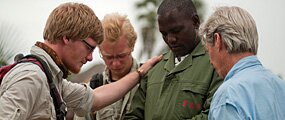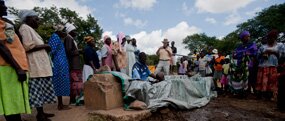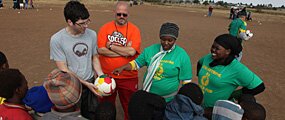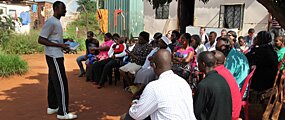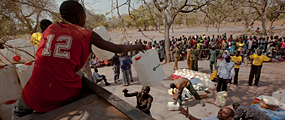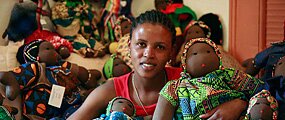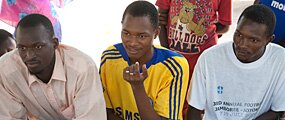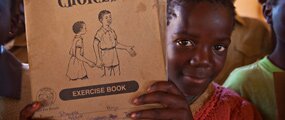Forty Years of Influence
Posted June 2, 2010
LUSAKA, Zambia — In 1970, the Beatles broke up, Earth Day was celebrated for the first time, the Concorde made its first supersonic flight, 500,000 people died in Bangladesh from a cyclone, and the first episode of the soap opera All My Children aired.
Franklin and Paula Kilpatrick didn’t notice many of these events. They were moving across the world to start a new life, in a new culture, as missionaries in Zambia.
“Some say, ‘Forty years sounds like forever,’” Paula said. “I think of it like the ‘70s were two days and then the ‘80s was like a day and the ‘90s like a day and [the last 10 years] like a day. So really we’ve only been here five days. That’s how I feel about it.
“It goes by in a hurry.”
The Kilpatricks are retiring next year to Pasadena, Texas, a suburb of Houston.
In 40 years of service in Zambia, they influenced a generation.
They worked among Zambian Christians as publishers of Christian literature, as teachers, as church planters and as leaders, friends and counselors.
As teachers and residents at the Baptist Theological Seminary in Zambia for almost 20 years, the Kilpatricks have watched about 165 students grow up. Some came as children when their parents attended seminary and later became students themselves.
Franklin often prayed at his desk for the students in his seminary classes, students who became leaders in their society. One of these, Reverend Ebby Musika, is now the chairman of the Baptist Fellowship of Zambia.
The current principal of the seminary is also their neighbor and friend. Once a student, Reverend Ezron Musonda is now Franklin’s boss at the seminary.
Another former student, Reverend Luke Buley, is now the executive secretary of the Baptist Fellowship of Zambia. Yet, he jokes with the Kilpatricks as old friends.
Franklin puts everyone at ease, and all students, both past and present, respect him. Paula, a quiet yet firm teacher, gently commands the attention of the wives attending her classes.
“There’s a lot of community here that we will miss when we return to America,” Franklin said.
Their two sons, Andy, 42, and Ben, 39, grew up in Zambia. Ben was born in Lusaka, the capital city, the year after the Kilpatricks moved to Zambia. He now teaches journalism and communications at Southwest Baptist University in Bolivar, Mo. Andy, a former journalist, is now a student at George W. Truett Theological Seminary in Waco, Texas.
Despite their lives in the United States, “[Zambia] is home; they would rather be here, I think, than [in America],” Franklin said. “This becomes your life and this is where you are.”
The Kilpatricks were reluctant to retire even though they reached retirement age four years ago. They had started a new project and didn’t feel they could leave without investing a few more years.
In this project, they teach military chaplains about AIDS prevention, palliative care and counseling, hoping the chaplains will continue the work after they retire.
More than 1 million Zambians tested positive for the HIV/AIDS virus in 2007 (the latest year for which data is available). There are likely many others who remain untested. A little more than 5 percent die each year.
“These workshops have been very successful as the chaplains have had an impact in bringing down the number of deaths from HIV infection through their counseling and getting people to be tested,” Franklin said.
The Kilpatricks also teach the chaplains and their wives to stay pure in marriage. They fight against a culture where witchdoctors and traditional healers often suggest the cure for HIV/AIDS is to sleep with virgins or married persons. It is also assumed by many Zambians if a married man isn’t satisfied with his wife he is free to have sex with any other woman.
The chaplains and their wives reproduce what they learn in the marriage seminars with other couples throughout Zambia. Franklin said the rate of HIV infection is higher within married couples than among youth. The chaplains’ work among other couples helps reduce this rate.
More than 100 chaplains have attended the workshops in the last four years.
“The training is relevant,” said Benny Njobvu, the project manager at Project Concern International, a partnering organization with the chaplain program. “The Baptist Fellowship of Zambia trains the chaplains and then the chaplains take what they have learned to their different posts and teach others.”
Although the Kilpatricks’ plan for reproducing the ministry is succeeding, they still seem reluctant to leave.
“In some ways you feel like you could keep doing what you’re doing,” Paula said. “You don’t feel old, and it’s your life and you like what you are doing and you could keep doing this forever.”
“If I had another 40 years I would keep going,” Franklin said.
If you are interested in making a life-long impact on the mission field, visit GOING.
Jeffery Aaron is a writer for IMB’s Global Communications Team. He has traveled to 17 African countries sharing the stories of God’s work on the continent.
















